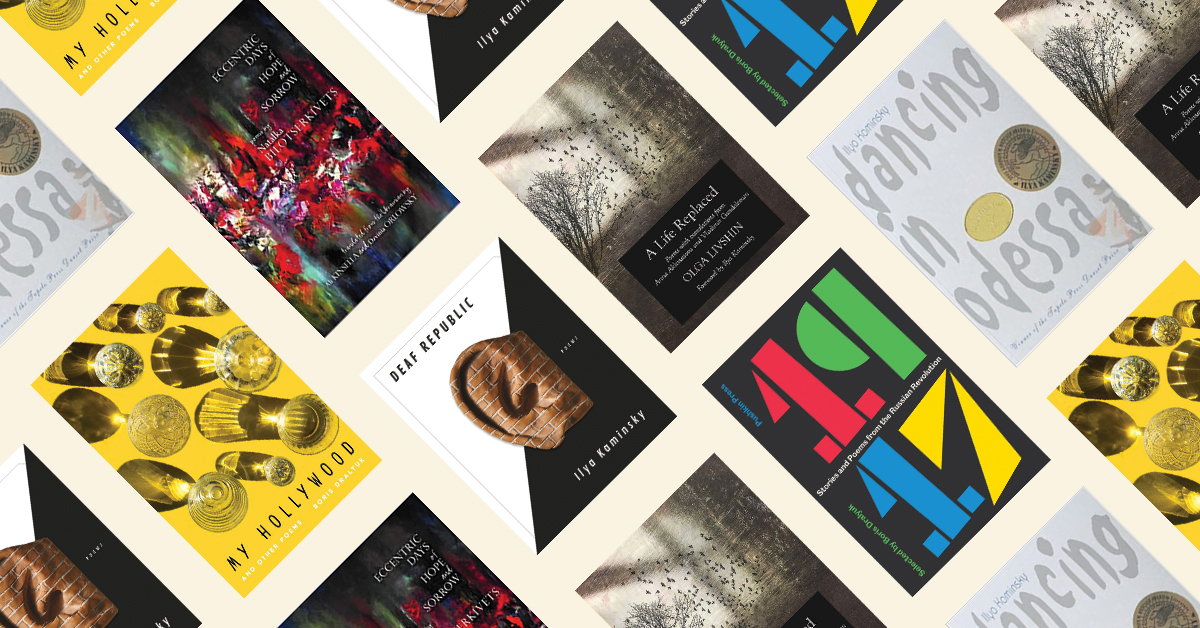4 Ukrainian Poets to Support
With the recent Russian invasion of Ukraine, many people are looking toward news outlets and politicians to deepen their understanding of this horrific conflict. Suddenly, Americans find themselves contemplating how best to show solidarity with Ukrainian people, a lofty yet worthwhile goal that includes educating themselves on Ukraine’s unique history and culture. Reading the work of influential Ukrainian poets can be a strong first step in establishing this knowledge and strengthening our collective empathy. These four poets provide an introduction to some of the most urgent and moving Ukrainian writing.
Ilya Kaminsky
No list of Ukrainian poets can leave off Ilya Kaminsky, a writer and translator born in the Soviet Union who has been awarded a Whiting Award, a Ruth Lily Poetry Fellowship, a Guggenheim Fellowship, and The National Jewish Book Award, among other honors. Kaminsky’s most recent collection, Deaf Republic, depicts a frenzied landscape of political unrest, exploring the impact that citizens speaking out or staying silent has on war, violence, and injustice. In light of the Russian invasion of Ukraine, Kaminsky’s poem “We Lived Happily During the War”—which illuminates how easily people become desensitized to global atrocities—went viral. The BBC has named Kaminsky as an “artist changing the world.”
Essential Ilya Kaminsky texts: Deaf Republic, Dancing in Odessa
Natalka Bilotserkivets
Natalka Bilotserkivets attended college in Kyiv—Ukraine’s capital city and one of the main sites targeted by Russian violence—and still lives there. She also works as the editor of Ukrainian Culture magazine. Much of Bilotserkivets’ work considers how to channel despair into political and social action, as represented by one of her most translated and studied poems, “We’ll Die Not in Paris.” The notable poem portrays and pushes back against widespread suffering and inequality, becoming a rallying cry for protestors and citizens who organized against the government of the Soviet Union.
Essential Natalka Bilotserkivets texts: Eccentric Days of Hope and Sorrow, Subterranean Fire
Olga Livshin
Olga Livshin is a Jewish-Ukrainian poet who grew up in Odesa and Moscow before immigrating to the United States as a teenager. Her work reflects this complex identity, often speaking to the Ukrainian diaspora, her experiences as an immigrant, current messaging and rhetoric around refugees, and the act of living between languages. Livshin evokes the words of Yuri Mikhailik, Vladimir Gandelsman, and Anna Akhmatova in her debut collection, A Life Replaced, drawing her own work into conversation with theirs to establish a sense of place and literary lineage. The collection contains a foreword from Ilya Kaminsky, who called Livshin’s poetry “hauntingly beautiful and unforgettable.”
Essential Olga Livshin text: A Life Replaced: Poems with Translations from Anna Akhmatova and Vladimir Gandelsman
Boris Dralyuk
Boris Dralyuk recently spoke to Jewish publication The Forward about the role of poetry in fighting oppressive regimes, characterizing it as a method of record-keeping and honestly reflecting historic events. Dralyuk also believes that poetry allows for a more vivid sense of empathy, empowering readers to step into people’s daily lives and emotional realities. He has worked as a translator and as an editor of numerous anthologies, including the groundbreaking 1917: Stories and Poems from the Russian Revolution. His debut collection, My Hollywood, releases this April and weaves together the unexpected parallels between Odessa, Dralyuk’s birthplace, and Los Angeles, his current home.
Essential Boris Dralyuk texts: My Hollywood (forthcoming, out in April 2022), 1917: Stories and Poems from the Russian Revolution
One of the most powerful aspects of poetry is how it can spur us to take action. If you’re looking for ways to help Ukrainian citizens, get started with this masterpost of organizations and resources.




